Project Management: Project Failures, Skills, and Solutions
VerifiedAdded on 2022/11/12
|5
|1842
|59
Report
AI Summary
This report delves into the multifaceted reasons behind project failures, emphasizing the critical role of project managers in mitigating risks and ensuring success. It identifies key areas where projects often falter, including inadequate resourcing (financial, human, and physical), poor planning, lack of risk management, ineffective communication, and misunderstandings of project scope. The report highlights the essential skills required of a project manager, such as leadership, effective communication, risk management, team management, and negotiation. Leadership skills encompass planning, decision-making, and overall project management, while effective communication is presented as a cornerstone of project success, involving clear objectives and stakeholder engagement. The report also underscores the importance of risk management in identifying, analyzing, and controlling potential project threats. Finally, it stresses the significance of team management and negotiation skills in fostering collaboration, resolving conflicts, and achieving project goals. The report utilizes several references to support its findings, providing a comprehensive overview of project management challenges and best practices.
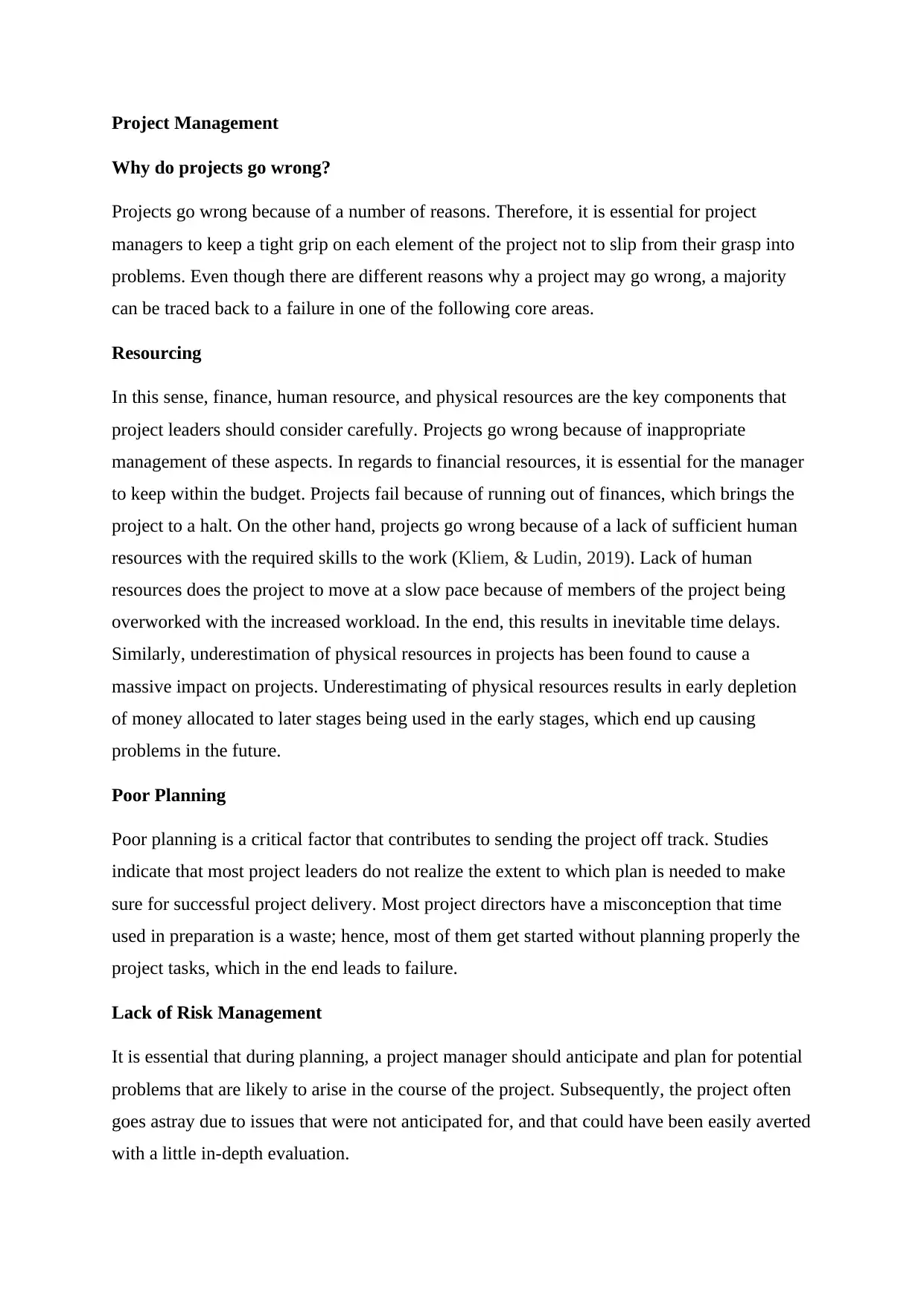
Project Management
Why do projects go wrong?
Projects go wrong because of a number of reasons. Therefore, it is essential for project
managers to keep a tight grip on each element of the project not to slip from their grasp into
problems. Even though there are different reasons why a project may go wrong, a majority
can be traced back to a failure in one of the following core areas.
Resourcing
In this sense, finance, human resource, and physical resources are the key components that
project leaders should consider carefully. Projects go wrong because of inappropriate
management of these aspects. In regards to financial resources, it is essential for the manager
to keep within the budget. Projects fail because of running out of finances, which brings the
project to a halt. On the other hand, projects go wrong because of a lack of sufficient human
resources with the required skills to the work (Kliem, & Ludin, 2019). Lack of human
resources does the project to move at a slow pace because of members of the project being
overworked with the increased workload. In the end, this results in inevitable time delays.
Similarly, underestimation of physical resources in projects has been found to cause a
massive impact on projects. Underestimating of physical resources results in early depletion
of money allocated to later stages being used in the early stages, which end up causing
problems in the future.
Poor Planning
Poor planning is a critical factor that contributes to sending the project off track. Studies
indicate that most project leaders do not realize the extent to which plan is needed to make
sure for successful project delivery. Most project directors have a misconception that time
used in preparation is a waste; hence, most of them get started without planning properly the
project tasks, which in the end leads to failure.
Lack of Risk Management
It is essential that during planning, a project manager should anticipate and plan for potential
problems that are likely to arise in the course of the project. Subsequently, the project often
goes astray due to issues that were not anticipated for, and that could have been easily averted
with a little in-depth evaluation.
Why do projects go wrong?
Projects go wrong because of a number of reasons. Therefore, it is essential for project
managers to keep a tight grip on each element of the project not to slip from their grasp into
problems. Even though there are different reasons why a project may go wrong, a majority
can be traced back to a failure in one of the following core areas.
Resourcing
In this sense, finance, human resource, and physical resources are the key components that
project leaders should consider carefully. Projects go wrong because of inappropriate
management of these aspects. In regards to financial resources, it is essential for the manager
to keep within the budget. Projects fail because of running out of finances, which brings the
project to a halt. On the other hand, projects go wrong because of a lack of sufficient human
resources with the required skills to the work (Kliem, & Ludin, 2019). Lack of human
resources does the project to move at a slow pace because of members of the project being
overworked with the increased workload. In the end, this results in inevitable time delays.
Similarly, underestimation of physical resources in projects has been found to cause a
massive impact on projects. Underestimating of physical resources results in early depletion
of money allocated to later stages being used in the early stages, which end up causing
problems in the future.
Poor Planning
Poor planning is a critical factor that contributes to sending the project off track. Studies
indicate that most project leaders do not realize the extent to which plan is needed to make
sure for successful project delivery. Most project directors have a misconception that time
used in preparation is a waste; hence, most of them get started without planning properly the
project tasks, which in the end leads to failure.
Lack of Risk Management
It is essential that during planning, a project manager should anticipate and plan for potential
problems that are likely to arise in the course of the project. Subsequently, the project often
goes astray due to issues that were not anticipated for, and that could have been easily averted
with a little in-depth evaluation.
Paraphrase This Document
Need a fresh take? Get an instant paraphrase of this document with our AI Paraphraser
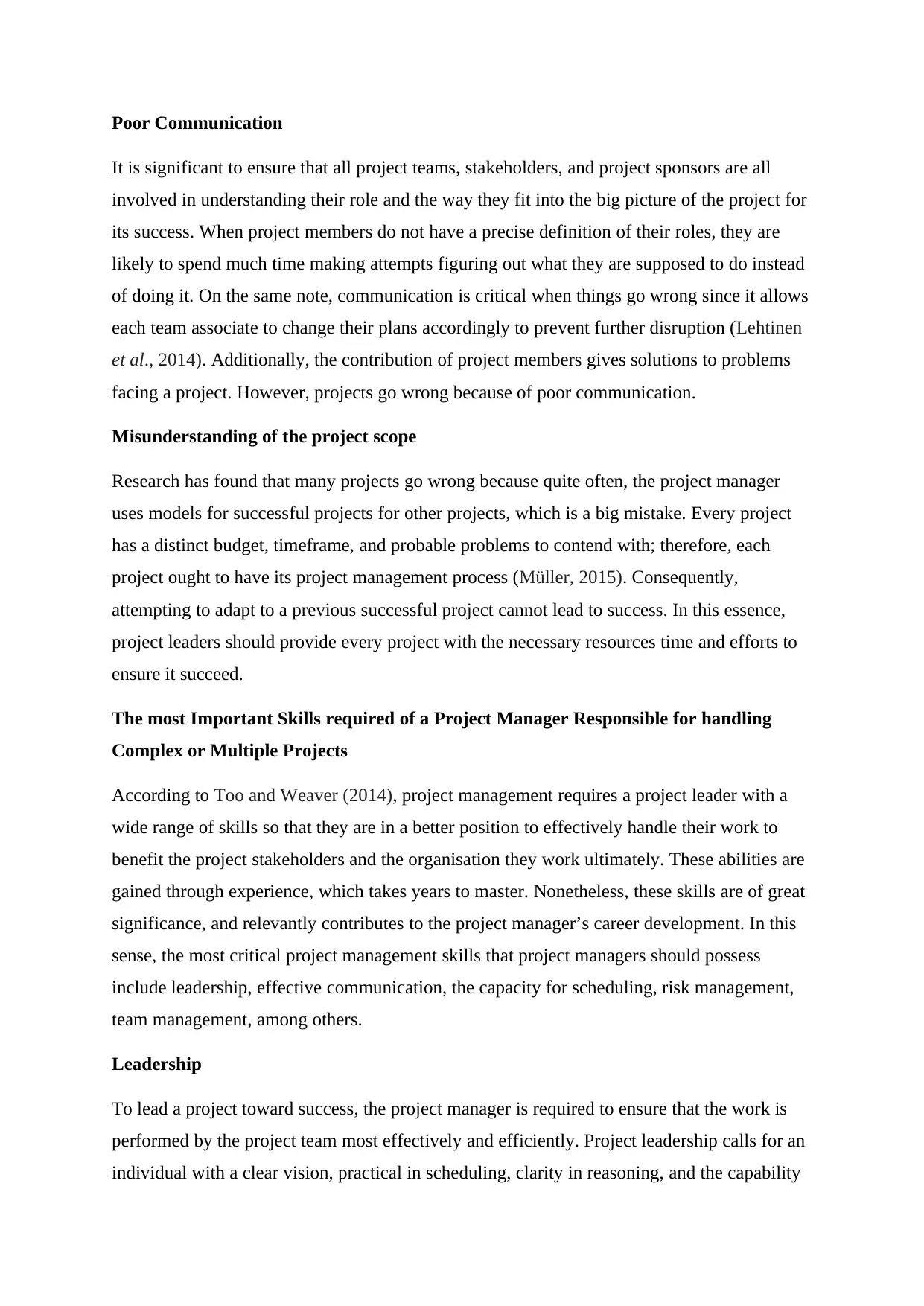
Poor Communication
It is significant to ensure that all project teams, stakeholders, and project sponsors are all
involved in understanding their role and the way they fit into the big picture of the project for
its success. When project members do not have a precise definition of their roles, they are
likely to spend much time making attempts figuring out what they are supposed to do instead
of doing it. On the same note, communication is critical when things go wrong since it allows
each team associate to change their plans accordingly to prevent further disruption (Lehtinen
et al., 2014). Additionally, the contribution of project members gives solutions to problems
facing a project. However, projects go wrong because of poor communication.
Misunderstanding of the project scope
Research has found that many projects go wrong because quite often, the project manager
uses models for successful projects for other projects, which is a big mistake. Every project
has a distinct budget, timeframe, and probable problems to contend with; therefore, each
project ought to have its project management process (Müller, 2015). Consequently,
attempting to adapt to a previous successful project cannot lead to success. In this essence,
project leaders should provide every project with the necessary resources time and efforts to
ensure it succeed.
The most Important Skills required of a Project Manager Responsible for handling
Complex or Multiple Projects
According to Too and Weaver (2014), project management requires a project leader with a
wide range of skills so that they are in a better position to effectively handle their work to
benefit the project stakeholders and the organisation they work ultimately. These abilities are
gained through experience, which takes years to master. Nonetheless, these skills are of great
significance, and relevantly contributes to the project manager’s career development. In this
sense, the most critical project management skills that project managers should possess
include leadership, effective communication, the capacity for scheduling, risk management,
team management, among others.
Leadership
To lead a project toward success, the project manager is required to ensure that the work is
performed by the project team most effectively and efficiently. Project leadership calls for an
individual with a clear vision, practical in scheduling, clarity in reasoning, and the capability
It is significant to ensure that all project teams, stakeholders, and project sponsors are all
involved in understanding their role and the way they fit into the big picture of the project for
its success. When project members do not have a precise definition of their roles, they are
likely to spend much time making attempts figuring out what they are supposed to do instead
of doing it. On the same note, communication is critical when things go wrong since it allows
each team associate to change their plans accordingly to prevent further disruption (Lehtinen
et al., 2014). Additionally, the contribution of project members gives solutions to problems
facing a project. However, projects go wrong because of poor communication.
Misunderstanding of the project scope
Research has found that many projects go wrong because quite often, the project manager
uses models for successful projects for other projects, which is a big mistake. Every project
has a distinct budget, timeframe, and probable problems to contend with; therefore, each
project ought to have its project management process (Müller, 2015). Consequently,
attempting to adapt to a previous successful project cannot lead to success. In this essence,
project leaders should provide every project with the necessary resources time and efforts to
ensure it succeed.
The most Important Skills required of a Project Manager Responsible for handling
Complex or Multiple Projects
According to Too and Weaver (2014), project management requires a project leader with a
wide range of skills so that they are in a better position to effectively handle their work to
benefit the project stakeholders and the organisation they work ultimately. These abilities are
gained through experience, which takes years to master. Nonetheless, these skills are of great
significance, and relevantly contributes to the project manager’s career development. In this
sense, the most critical project management skills that project managers should possess
include leadership, effective communication, the capacity for scheduling, risk management,
team management, among others.
Leadership
To lead a project toward success, the project manager is required to ensure that the work is
performed by the project team most effectively and efficiently. Project leadership calls for an
individual with a clear vision, practical in scheduling, clarity in reasoning, and the capability
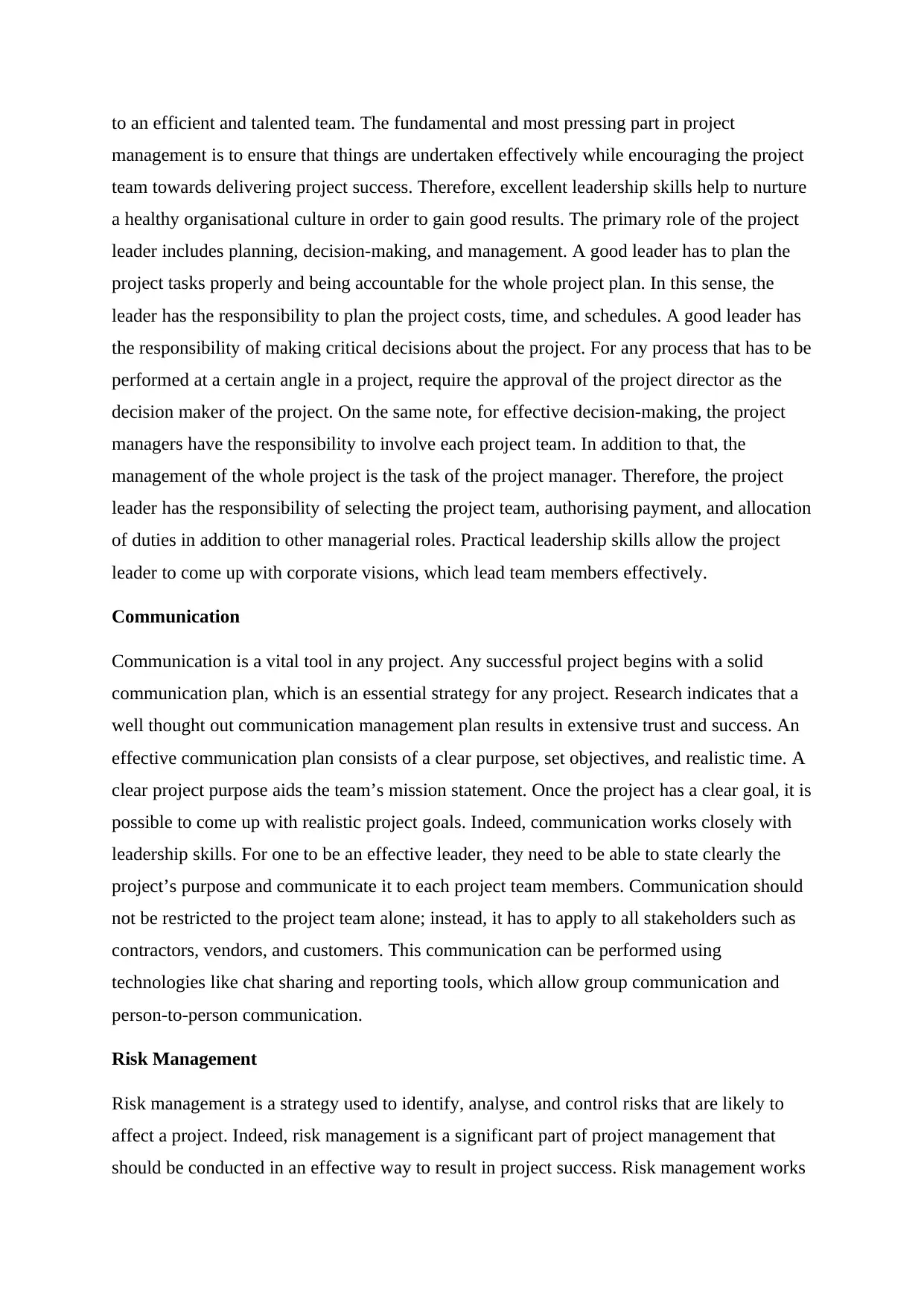
to an efficient and talented team. The fundamental and most pressing part in project
management is to ensure that things are undertaken effectively while encouraging the project
team towards delivering project success. Therefore, excellent leadership skills help to nurture
a healthy organisational culture in order to gain good results. The primary role of the project
leader includes planning, decision-making, and management. A good leader has to plan the
project tasks properly and being accountable for the whole project plan. In this sense, the
leader has the responsibility to plan the project costs, time, and schedules. A good leader has
the responsibility of making critical decisions about the project. For any process that has to be
performed at a certain angle in a project, require the approval of the project director as the
decision maker of the project. On the same note, for effective decision-making, the project
managers have the responsibility to involve each project team. In addition to that, the
management of the whole project is the task of the project manager. Therefore, the project
leader has the responsibility of selecting the project team, authorising payment, and allocation
of duties in addition to other managerial roles. Practical leadership skills allow the project
leader to come up with corporate visions, which lead team members effectively.
Communication
Communication is a vital tool in any project. Any successful project begins with a solid
communication plan, which is an essential strategy for any project. Research indicates that a
well thought out communication management plan results in extensive trust and success. An
effective communication plan consists of a clear purpose, set objectives, and realistic time. A
clear project purpose aids the team’s mission statement. Once the project has a clear goal, it is
possible to come up with realistic project goals. Indeed, communication works closely with
leadership skills. For one to be an effective leader, they need to be able to state clearly the
project’s purpose and communicate it to each project team members. Communication should
not be restricted to the project team alone; instead, it has to apply to all stakeholders such as
contractors, vendors, and customers. This communication can be performed using
technologies like chat sharing and reporting tools, which allow group communication and
person-to-person communication.
Risk Management
Risk management is a strategy used to identify, analyse, and control risks that are likely to
affect a project. Indeed, risk management is a significant part of project management that
should be conducted in an effective way to result in project success. Risk management works
management is to ensure that things are undertaken effectively while encouraging the project
team towards delivering project success. Therefore, excellent leadership skills help to nurture
a healthy organisational culture in order to gain good results. The primary role of the project
leader includes planning, decision-making, and management. A good leader has to plan the
project tasks properly and being accountable for the whole project plan. In this sense, the
leader has the responsibility to plan the project costs, time, and schedules. A good leader has
the responsibility of making critical decisions about the project. For any process that has to be
performed at a certain angle in a project, require the approval of the project director as the
decision maker of the project. On the same note, for effective decision-making, the project
managers have the responsibility to involve each project team. In addition to that, the
management of the whole project is the task of the project manager. Therefore, the project
leader has the responsibility of selecting the project team, authorising payment, and allocation
of duties in addition to other managerial roles. Practical leadership skills allow the project
leader to come up with corporate visions, which lead team members effectively.
Communication
Communication is a vital tool in any project. Any successful project begins with a solid
communication plan, which is an essential strategy for any project. Research indicates that a
well thought out communication management plan results in extensive trust and success. An
effective communication plan consists of a clear purpose, set objectives, and realistic time. A
clear project purpose aids the team’s mission statement. Once the project has a clear goal, it is
possible to come up with realistic project goals. Indeed, communication works closely with
leadership skills. For one to be an effective leader, they need to be able to state clearly the
project’s purpose and communicate it to each project team members. Communication should
not be restricted to the project team alone; instead, it has to apply to all stakeholders such as
contractors, vendors, and customers. This communication can be performed using
technologies like chat sharing and reporting tools, which allow group communication and
person-to-person communication.
Risk Management
Risk management is a strategy used to identify, analyse, and control risks that are likely to
affect a project. Indeed, risk management is a significant part of project management that
should be conducted in an effective way to result in project success. Risk management works
⊘ This is a preview!⊘
Do you want full access?
Subscribe today to unlock all pages.

Trusted by 1+ million students worldwide
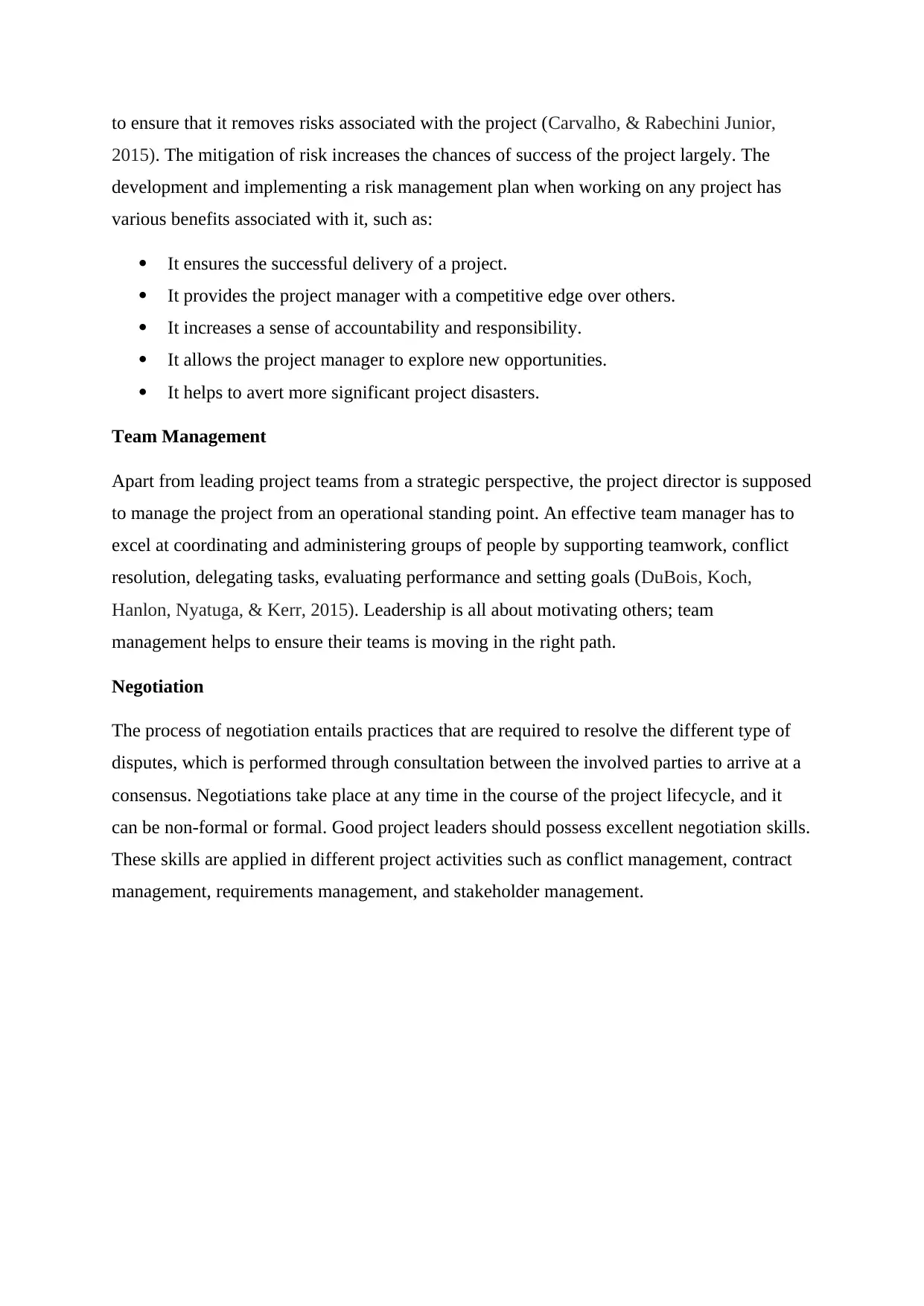
to ensure that it removes risks associated with the project (Carvalho, & Rabechini Junior,
2015). The mitigation of risk increases the chances of success of the project largely. The
development and implementing a risk management plan when working on any project has
various benefits associated with it, such as:
It ensures the successful delivery of a project.
It provides the project manager with a competitive edge over others.
It increases a sense of accountability and responsibility.
It allows the project manager to explore new opportunities.
It helps to avert more significant project disasters.
Team Management
Apart from leading project teams from a strategic perspective, the project director is supposed
to manage the project from an operational standing point. An effective team manager has to
excel at coordinating and administering groups of people by supporting teamwork, conflict
resolution, delegating tasks, evaluating performance and setting goals (DuBois, Koch,
Hanlon, Nyatuga, & Kerr, 2015). Leadership is all about motivating others; team
management helps to ensure their teams is moving in the right path.
Negotiation
The process of negotiation entails practices that are required to resolve the different type of
disputes, which is performed through consultation between the involved parties to arrive at a
consensus. Negotiations take place at any time in the course of the project lifecycle, and it
can be non-formal or formal. Good project leaders should possess excellent negotiation skills.
These skills are applied in different project activities such as conflict management, contract
management, requirements management, and stakeholder management.
2015). The mitigation of risk increases the chances of success of the project largely. The
development and implementing a risk management plan when working on any project has
various benefits associated with it, such as:
It ensures the successful delivery of a project.
It provides the project manager with a competitive edge over others.
It increases a sense of accountability and responsibility.
It allows the project manager to explore new opportunities.
It helps to avert more significant project disasters.
Team Management
Apart from leading project teams from a strategic perspective, the project director is supposed
to manage the project from an operational standing point. An effective team manager has to
excel at coordinating and administering groups of people by supporting teamwork, conflict
resolution, delegating tasks, evaluating performance and setting goals (DuBois, Koch,
Hanlon, Nyatuga, & Kerr, 2015). Leadership is all about motivating others; team
management helps to ensure their teams is moving in the right path.
Negotiation
The process of negotiation entails practices that are required to resolve the different type of
disputes, which is performed through consultation between the involved parties to arrive at a
consensus. Negotiations take place at any time in the course of the project lifecycle, and it
can be non-formal or formal. Good project leaders should possess excellent negotiation skills.
These skills are applied in different project activities such as conflict management, contract
management, requirements management, and stakeholder management.
Paraphrase This Document
Need a fresh take? Get an instant paraphrase of this document with our AI Paraphraser
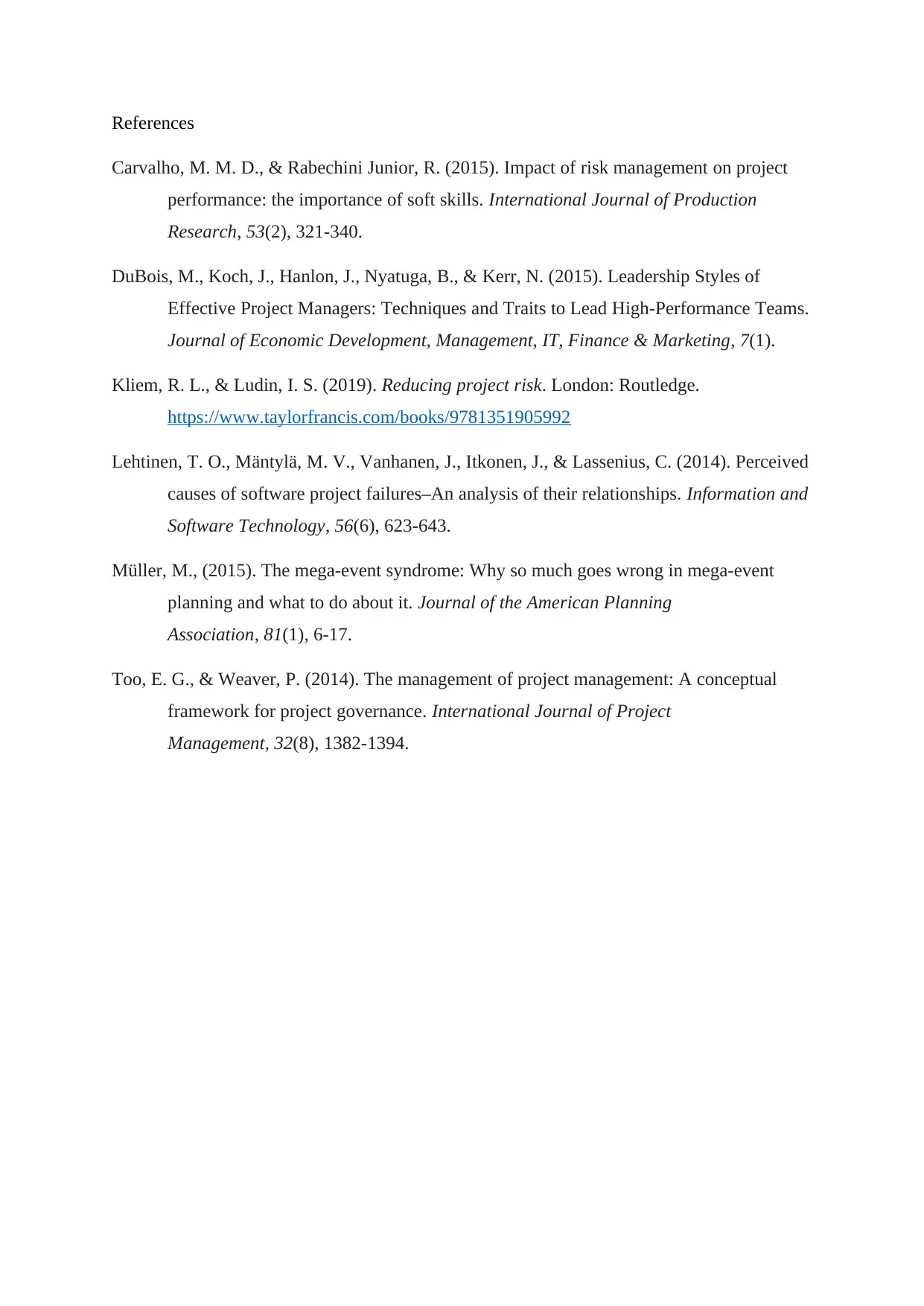
References
Carvalho, M. M. D., & Rabechini Junior, R. (2015). Impact of risk management on project
performance: the importance of soft skills. International Journal of Production
Research, 53(2), 321-340.
DuBois, M., Koch, J., Hanlon, J., Nyatuga, B., & Kerr, N. (2015). Leadership Styles of
Effective Project Managers: Techniques and Traits to Lead High-Performance Teams.
Journal of Economic Development, Management, IT, Finance & Marketing, 7(1).
Kliem, R. L., & Ludin, I. S. (2019). Reducing project risk. London: Routledge.
https://www.taylorfrancis.com/books/9781351905992
Lehtinen, T. O., Mäntylä, M. V., Vanhanen, J., Itkonen, J., & Lassenius, C. (2014). Perceived
causes of software project failures–An analysis of their relationships. Information and
Software Technology, 56(6), 623-643.
Müller, M., (2015). The mega-event syndrome: Why so much goes wrong in mega-event
planning and what to do about it. Journal of the American Planning
Association, 81(1), 6-17.
Too, E. G., & Weaver, P. (2014). The management of project management: A conceptual
framework for project governance. International Journal of Project
Management, 32(8), 1382-1394.
Carvalho, M. M. D., & Rabechini Junior, R. (2015). Impact of risk management on project
performance: the importance of soft skills. International Journal of Production
Research, 53(2), 321-340.
DuBois, M., Koch, J., Hanlon, J., Nyatuga, B., & Kerr, N. (2015). Leadership Styles of
Effective Project Managers: Techniques and Traits to Lead High-Performance Teams.
Journal of Economic Development, Management, IT, Finance & Marketing, 7(1).
Kliem, R. L., & Ludin, I. S. (2019). Reducing project risk. London: Routledge.
https://www.taylorfrancis.com/books/9781351905992
Lehtinen, T. O., Mäntylä, M. V., Vanhanen, J., Itkonen, J., & Lassenius, C. (2014). Perceived
causes of software project failures–An analysis of their relationships. Information and
Software Technology, 56(6), 623-643.
Müller, M., (2015). The mega-event syndrome: Why so much goes wrong in mega-event
planning and what to do about it. Journal of the American Planning
Association, 81(1), 6-17.
Too, E. G., & Weaver, P. (2014). The management of project management: A conceptual
framework for project governance. International Journal of Project
Management, 32(8), 1382-1394.
1 out of 5
Related Documents
Your All-in-One AI-Powered Toolkit for Academic Success.
+13062052269
info@desklib.com
Available 24*7 on WhatsApp / Email
![[object Object]](/_next/static/media/star-bottom.7253800d.svg)
Unlock your academic potential
Copyright © 2020–2026 A2Z Services. All Rights Reserved. Developed and managed by ZUCOL.





![Project Scheduling and Time Management Report - [Course Name]](/_next/image/?url=https%3A%2F%2Fdesklib.com%2Fmedia%2Fimages%2Fvl%2F08ca5540273c481b91219691dd50a94c.jpg&w=256&q=75)